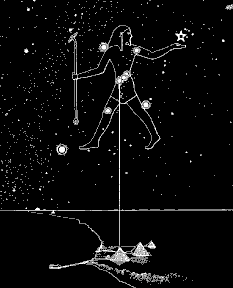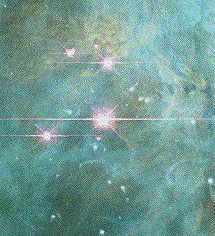
If each animal reflects particular aspects of the Great Spirit, man, on the contrary, may include within himself all aspects. He is thus a totality, bearing the Universe within himself, and through his Intellect having the potential capacity to live in continual awareness of this reality. 'Peace . . . comes within the souls of men when they realize their relationship, their oneness, with the Universe and all its powers, and when they realize that at the center of the Universe dwells Wakan-Tanka, and that this center is really everywhere, it is within each of us.' [Black Elk's words] The Indian believes that such knowledge can not be realized unless there be perfect humility. Only in being nothing may man become everything.
In today's civilization people have sought to 'become everything' without 'being nothing.' Our strong suit has not been humility, but rather complaint and criticism, based on the assumption that external conditions cause our frustrations. But it is quite possible that frustration and confusion arise not because of what is happening around u-world conditions, local conditions, or what other people are doing-but because we have built up convictions about what should or shouldn't happen. Then our views tend to be self-fulfilling, and our arrogance remains, clouding our expression of light. It is as simple as that. Only as we respect the presence of the Great Spirit, Wakan-Tanka, can we know ourselves, can we let the inner light be revealed. That light is the property of the Great Spirit, and this is not to say we are separate from that. We may be inclined to think of God, Allah, the Great Spirit 'however it might be termed' as separate from ourselves. The idea is that 'God's a good guy over there. It's a pity we can't be like Him.' That concept is born of false humility, essentially the belief that 'we're no good and we have no inner light.' But there is an inner light, and that light blends perfectly with the source of all light. With this awareness, we stop thinking that we can do whatever we like and get away with it. Because of the condition of isolation, born of fear and self-preoccupation, great agony torments the human race. The evidence of this is increasingly portrayed in the deterioration of the planet, summed up in a few choice words by an old Omaha Indian, again from Joseph Epes Brown's pamphlet:
Now the face of all the land is changed and sad. The living creatures are gone. I see the land desolate and I suffer an unspeakable sadness. Sometimes I wake in the night and I feel as though I should suffocate from the pressure of this awful feeling of loneliness.
These eloquent, mournful words, I suspect, speak for the mass of humanity. Many might not be able to articulate them, but the feeling is common. Black Elk said this near the end of his life, speaking of the heritage of his people:
With tears running, O Great Spirit, Great Spirit, my Grandfather?with running tears I must say now that the tree has never bloomed. A pitiful old man, you see here, and I have fallen away and have done nothing. Here at the center of the world, where you took me when I was young and taught me; here, old I stand, and the tree is withered, Grandfather, my Grandfather!
Feelings of emptiness and loneliness ache in the
hearts of all people, even though some of us have become skillful at covering
them over. We can speak silver-tongued words, filled with hope for better
times, but there is something hollow about it all. This begins to resolve
when a person comes to a place of true humility, willing to give up the
selfish ways in which we all have been trained. We will begin to let go
of this cloudy condition only when we can say, 'Self-concern will not prevail.
What are the needs of the grand purpose? What is the honorable thing to
do in this situation? 'Once this stance is taken there is an opening for
the release of light through men and women' and all creatures and kingdoms
of the earth are uplifted. Oh, to let these human facilities be like a
flake of glass through which light may pass! This is such a straightforward
and simple task, but it must be consistently done in order to have real
effect. Henry David Thoreau said that most people lead lives of quiet desperation.
Many people feel they live in a hostile environment, and they yearn for
home?a home which is ever elusive. Whether in our individual lives or on
the world stage, most of us spend our energy trying to create a safe, peaceable
place where well-being and fulfillment may be experienced. But this is
simply not available outside the context of the larger picture. Thoreau's
friend Ralph Waldo Emerson said that the purpose of life is not to be happy
but to be useful. To that I would add: to be useful to the Great Spirit.
That is what makes true happiness possible, and it fulfills the yearning
for home and purpose. Paradoxically, you can't have fulfillment until you
stop being self-preoccupied, until you become transparent, so that you
are simply available to let light shine. Then, whatever true purpose is,
whatever life's grand purpose is, will unfold, and the sad words of Black
Elk may dissolve and the overall sorrow of the human state may fade away.
There is no longer any need to criticize or blame when we are at home in
our own skins in the midst of the grand order of life. Thankfulness is
natural. Trust is natural. On this basis an irresistible reminder of the
only way that works, or ever has worked, may be given. It is important
to experience this not merely to believe it or to write about it, but to
actually live this way. Here is an educational message that can make a
difference for the young people of the world. In this pitiful human condition,
no matter how wizened we may look, are we not all young? In universal terms
none of us has been around for more than a blink of an eye. In humility,
we must acknowledge that we have places in the grand scheme, and important
roles to play therein. Being in place, contributing what is ours to contribute,
is the foundation for genuine individuality and fulfillment.
.

Those who attain some ultimate understanding of these things are called "Buddhas," which means "awakened ones." The word is connected to the English verb "to bud." I once wrote a little parable: Who The Buddhas Are ...
All the beings of the universe are already realized. That is, with the exception of one or two beings. In those rare cases the cities, villages, meadows, and forests, with their birds, flowers, animals, rivers, trees, and humans, that surround such a person, all collaborate to educate, serve, challenge, and instruct such a one, until that person also becomes a New Beginner Enlightened Being. Recently realized beings are enthusiastic to teach and train and start schools and practices. Being able to do this develops their confidence and insight up to the point that they are fully ready to join the seamless world of interdependent play. Such new enlightened beginners are called "Buddhas" and they like to say things like "I am enlightened, together with the whole universe" and so forth.
Good luck! One might say. The test of the pudding is in the eating. It narrows down to a look at the conduct that is entwined with food. At mealtime (seated on the floor in lines) the Zen monks chant:
And several other verses. These superstitious-sounding old ritual formulas are never mentioned in lectures, but they are at the heart of the teaching. Their import is older than Buddhism or any of the world religions. They are part of the first and last practice of the wild: Grace.
Everyone who ever lived took the lives of other animals, pulled plants, plucked fruit, and ate. Primary people have their own ways of trying to understand the precept of nonharming. They knew that taking life required gratitude and care. There is no death that is not somebody's food, no life that is not somebody's death. Some would take this as a sign that the universe is fundamentally flawed. This leads to a disgust with self, with humanity, and with nature. Otherworldly philosophies end up doing more damage to the planet (and human psyches) than the pain and suffering that is in the existential conditions they seek to transcend.
The archaic religion is to kill god and eat him. Or her. The shimmering food-chain, the food-web, is the scary, beautiful condition of the biosphere. Subsistence people live without excuses. The blood is on your own hands as you divide the liver from the gallbladder. You have watched the color fade on the glimmer of the trout. A subsistence economy is a sacramental economy because it has faced up to one of the critical problems of life and death: the taking of life for food. Contemporary people do not need to hunt, many cannot even afford meat, and in the developed world the variety of foods available to us makes the avoidance of meat an easy choice. Forests in the tropics are cut to make pasture to raise beef for the American market. Our distance from the source of our food enables us to be superficially more comfortable, and distinctly more ignorant.
Eating is a sacrament. The grace we say clears our hearts and guides the children and welcomes the guest, all at the same time. We look at eggs, apples, and stew. They are evidence of plentitude, excess, a great reproductive exuberance. Millions of grains of grass-seed that will become rice or flour, millions of codfish fry that will never, and must never, grow to maturity. Innumerable little seeds are sacrifices to the food-chain. A parsnip in the ground is a marvel of living chemistry, making sugars and flavors from earth, air, water. And if we do eat meat it is the life, the bounce, the swish, of a great alert being with keen ears and lovely eyes, with foursquare feet and a huge beating heart that we eat, let us not deceive ourselves.
We too will be offerings - we are all edible. And if we are not devoured quickly, we are big enough (like old down trees) to provide a long slow meal to the smaller critters. Whale caracsses that sink several miles deep in the ocean feed organisms in the dark for fifteen years. (It seems to take about two thousand to exhaust the nutrients in a high civilization.)
Anyone can use a grace from their own tradition (and really give it meaning) - or make up their own. Saying some form of grace is never inappropriate, and speeches and announcements can be tacked onto it. It is a plain, ordinary, old-fashioned little thing to do that connects us with all our ancestors.
